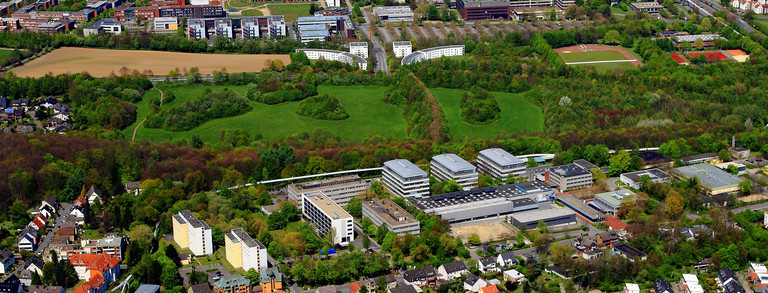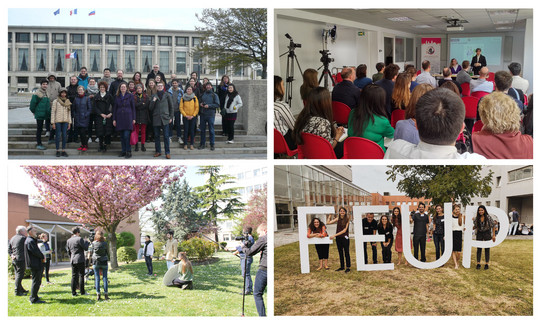Reviving shrinking cities – innovative paths and perspectives towards livability for shrinking cities in Europe (2019-2022)

The Innovative Training Network “Reviving shrinking cities – innovative paths and perspectives towards livability for shrinking cities in Europe” (RE-CITY ITN) will expand state-of-the-art knowledge on shrinking cities by exploring and evaluating new approaches and success factors for regenerating urban areas facing demographic and structural change.
The project has received funding from the European Union’s Horizon 2020 research and innovation programme under the Marie Skłodowska-Curie grant agreement No. 813803.
Through interdisciplinary, joint research training implemented at partner institutions, the RE-CITY ITN aims to train 13 Early Stage Researchers (ESRs) in four key research themes: conceptualising shrinking smart, governing, greening/right-sizing, and regrowing shrinking cities.
Ultimately, RE-CITY is expected to build a new generation of highly-skilled experts as well as to develop new knowledge and novel solutions for promoting livability in shrinking environments.
The ESRs will be hosted at one of the nine beneficiary-institutions of RE-CITY located in eight countries (Germany, United Kingdom, France, Luxemburg, Netherlands, Portugal, Poland and Mexico). In addition to beneficiary-institutions, the RE-CITY consortium includes seven partner-institutions and companies from four countries (Germany, Netherlands, USA and Japan.)
Through co-supervision by academics and non-academic partners, the ESRs will develop their individual research projects by engaging in a critical, practical, creative and cross-cutting exploration of the above-mentioned research themes. In addition to undertaking doctoral research, the ESRs will be involved in a series of research collaborations (secondments), workshops and training schools in order to acquire skills and expertise in tackling social, economic and ecological challenges linked to policy agendas dealing with urban shrinkage.
Within the framework of the RE-CITY ITN, the Department of Spatial Planning and Planning Theory will host two ESR positions working on the following individual projects:
- “Strategic planning and policy-making for shrinking cities” undertaken by M.Sc. Ruiying Liu (ESR #5) under the supervision of Prof. Dr. Thorsten Wiechmann and Prof. Dr. Marco Bontje (University of Amsterdam);
- “The role of culture-led regeneration in shrinking cities” undertaken by M.Sc. Anastasiya Matyushkina (ESR #11) under the supervision of Prof. Dr. Thorsten Wiechmann and Prof. Dr. Tadeusz Stryjakiewicz (Adam Mickiewicz University Poznań).
In addition, the department will host the secondment of M.Sc. Victoria Pinoncély (ESR #1) working on “Strategies for shrinking cities from historical perspective-path dependencies and learning from failures of the past” under the supervision of Prof. Dr. Emmanuèle Cunningham Sabot (École Normale Supérieure Paris) and Prof. Dr. Thorsten Wiechmann.
Project Coordinator: Prof. Dr. Karina Pallagst, M.Sc. René Fleschurz (Technische Universität Kaiserslautern)
ROP Team: Prof. Dr. Thorsten Wiechmann, Dr. Letizia Imbres, M.Sc. Ruiying Liu, M.Sc. Anastasiya Matyushkina
Cooperation Partners : Technische Universität Kaiserslautern (Germany), Cambridge Architectural Research (UK), École Normale Supérieure Paris (France), Spatial Foresight (Luxemburg), University of Amsterdam (Netherlands), University of Porto (Portugal), Adam Mickiewicz University Poznań (Poland), University of Guadalajara (Mexico), Bertelsmann Stiftung (Germany), Energy Agency Rhineland-Palatinate (Germany), Helmholtz Centre for Environmental Research (Germany), Netherlands Expert Centre on Demographic Change (Netherlands), Kent State University (USA), Fresh Völklingen GmbH (Germany), Nomura Research Institute Ltd (Japan).
Project Homepage: RE-CITY ITN Web Site
Kontakt
Prof. Dr. habil. Thorsten Wiechmann
Dr. Letizia Imbres
M.Sc. Ruiying Liu
M.Sc. Anastasiya Matyushkina
Duration of the project:
01.04.2019 to 31.03.2022
Funding source: European Union’s Horizon 2020







